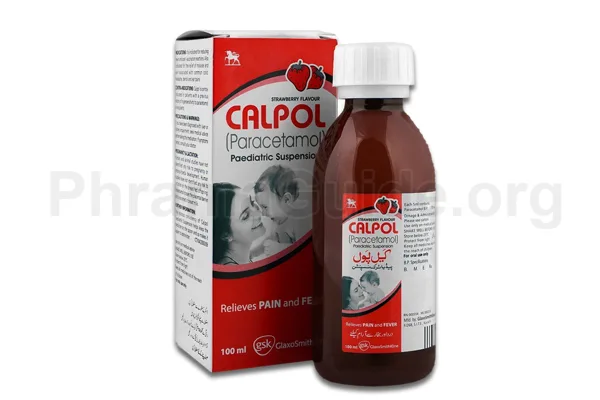Calpol syrup is used to treat mild to moderate pain and fever in babies and children. It is an over-the-counter medication that has analgesic and antipyretic properties. Calpol Syrup formulation is mostly recommended for children and adults where a low dose of medicine is needed. The following are some common and off-label uses of Calpol Syrup:
Common Uses of Calpol Syrup
- Pain Relief: Calpol syrup is often used to alleviate mild to moderate pain in children, including headaches, toothaches, earaches, and muscle aches. It can provide temporary relief from pain caused by various conditions, injuries, or illnesses.
- Fever Reduction: Calpol syrup is commonly used to reduce fever associated with viral or bacterial infections, such as colds, flu, or other illnesses. It can help to lower elevated body temperatures and provide relief from fever-related discomfort.
- Post-Vaccination Fever and Discomfort: Calpol syrup may be given to children before or after vaccination to help alleviate pain and reduce fever associated with immunizations (vaccination). This can help provide comfort and minimize any potential side effects from the vaccinations.
Off-label Uses of Calpol Syrup
- Pain Relief after Minor Procedures: Calpol syrup may be prescribed off-label to provide pain relief after minor surgical or dental procedures in children.
- Adjunctive Fever Relief: In some cases, Calpol syrup may be used alongside other antipyretic medications to manage high fever or fever that does not respond well to single-agent treatment.
- Combination Therapy: Calpol syrup might be prescribed off-label as part of combination therapy for certain medical conditions, along with other medications as deemed appropriate by the healthcare professional.

What is Calpol?
Calpol Syrup is one of the leading brands of Paracetamol, manufactured and marketed by GlaxoSmithKline (GSK).
Calpol Alternatives : Paracetamol Other Brands
The following are some alternative brands of Calpol syrup and their manufacturers.
Panadol : GlaxoSmithKline (GSK)
Febrol : Barrett Hodgson Pakistan (Pvt) Ltd.
Disprol : Reckitt Benckiser Ltd.
Pedrol : Stanley Pharmaceuticals (Pvt) Ltd, Pakistan.
Anamol : P. D. H Pharmaceuticals (Pvt) Ltd, Pakistan.
Benamol : Trigon Pharmaceuticals Pakistan (Pvt) Ltd.
Biomol : Biosyth Pharma (Pvt) Ltd, Pakistan.
Campol : Syntex Pharmaceuticals, Pakistan.
Fevamol : Swiss Pharmaceuticals (Pvt) Ltd
Panaram : Efroze Chemical Industries (Pvt) Ltd, Pakistan.
Calpol : Available Formulations and Strengths
Presently, Calpol is available in Syrup and Tablet forms.
Calpol Syrup: 120mg per 100ml strength.
Calpol Six Plus Suspension : Paracetamol 250mg per 5ml strength.
Calpol Tablet : 500mg strength.
Who Should Not Use Calpol?
Calpol syrup is generally considered safe when used as directed. However, there are certain contraindications, or specific situations or conditions, in which the use of Calpol syrup may not be recommended.
- Hypersensitivity: Calpol syrup is contraindicated in individuals who have a known hypersensitivity or allergic reaction to paracetamol or any other components of the medication. Allergic reactions to Calpol may include skin rashes, itching, swelling, or difficulty breathing.
- Severe Liver Disease: Calpol is primarily metabolized in the liver, and excessive use or overdose can lead to liver damage. Therefore, Calpol syrup should be used with caution or avoided in individuals with severe liver disease or liver impairment.
- G6PD Deficiency: Glucose-6-phosphate dehydrogenase (G6PD) deficiency is a genetic condition that can lead to the breakdown of red blood cells when triggered by certain medications, including paracetamol. Calpol syrup should be avoided in individuals with known G6PD deficiency.
- Other Medications: Calpol syrup may interact with other medications, especially those that affect liver function or contain paracetamol. It’s essential to inform a healthcare professional about all the medications, supplements, or herbal products you are taking before using Calpol syrup to avoid potential interactions.
- Pre-existing Medical Conditions: Individuals with certain medical conditions, such as severe kidney disease, may need to use Calpol syrup with caution or under the guidance of a healthcare professional.
Recommended Daily Dosage of Calpol Syrup?
Calpol Syrup Dose for Children (2 months to 6 years):
- 2.5 ml to 5 ml (approximately half to one teaspoon) every 4 to 6 hours, as needed.
- The maximum daily dose should not exceed 20 ml (approximately 4 teaspoons) within a 24-hour period.
Calpol Syrup Dose for Children (6 to 12 years):
- 5 ml to 10 ml (approximately one to two teaspoons) every 4 to 6 hours, as needed.
- The maximum daily dose should not exceed 40 ml (approximately 8 teaspoons) within a 24-hour period.
Calpol Syrup Dose for Adults and Adolescents (12 years and older):
- 10 ml to 20 ml (approximately two to four teaspoons) every 4 to 6 hours, as needed.
- The maximum daily dose should not exceed 80 ml (approximately 16 teaspoons) within a 24-hour period.
How Calpol Works?
Calopl works by inhibiting an enzyme called cyclooxygenase (COX) in the central nervous system. This enzyme is responsible for the production of prostaglandins, which are hormone-like substances involved in pain, inflammation, and fever. By inhibiting COX, Calpol reduces the production of prostaglandins, thereby reducing pain and fever.
Related Links:

Leave A Comment